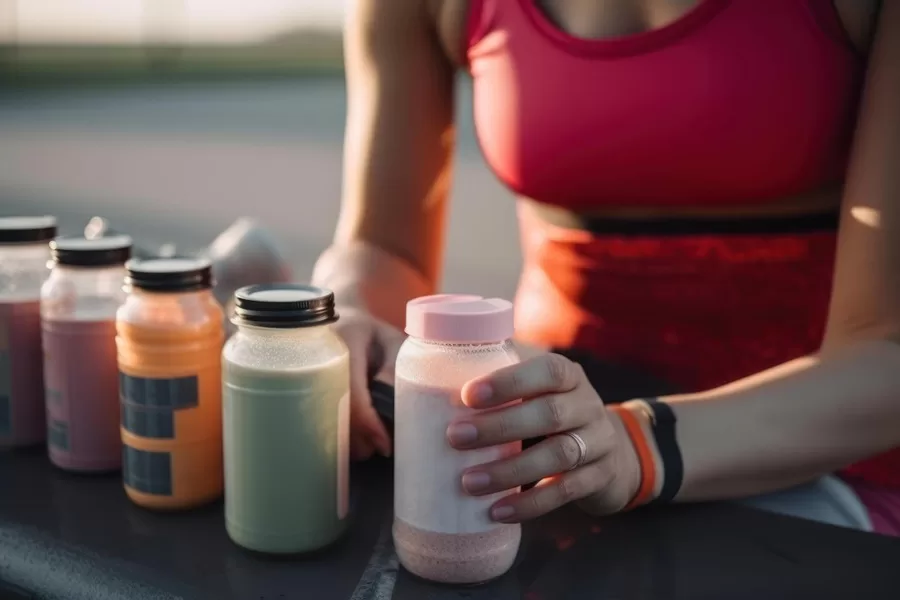
Do you exercise but don’t see any results? Maybe you need to add a protein supplement to your diet? But how to choose it correctly?
Protein and Muscle Gain
- Whey: This type is really popular, especially if you go to the gym. It comes from milk and your body takes it in quickly. This makes it great for eating right after you exercise. Whey protein has all the important bits your muscles need to get fixed fast.
- Casein: This one is different from whey because your body takes longer to use it. It’s good to take before you sleep. While you’re resting, casein protein slowly helps your muscles to grow and repair.
- Plant-based: These are from plants like peas, rice, or soy. They are awesome for people who don’t eat meat or milk products. They’re also good for your stomach and come with extra healthy stuff like fiber.
Every type of protein has its own special thing. Whey protein is quick, so it’s good after your gym session. Casein is slow, so it’s good all day or at night. Plant-based proteins are not only for muscle repair but also keep your whole body healthy.
Protein helps your muscles to get big and strong. You can pick whey, casein, or plant-based depending on what you like and need. Eating enough protein is key for growing your muscles. Just remember, eating a variety of foods is important to stay healthy.
How to Pick the Right Protein Powder or Drink
- Amount: Look at how much protein is in each serving. It’s important to have enough protein to help your muscles grow. The right amount depends on how much you exercise and your body’s needs. Not everyone needs the same amount of protein, so find what works for you.
- Extra Nutrients: Some protein powders and drinks have vitamins or minerals added. These can help with your overall health as well as muscle recovery and growth. But, watch out for added sugars or artificial stuff that you might not want.
- Taste: The flavor is important. If you don’t like how it tastes, you might not use it as much. There are many flavors to try, so find one you really like. Some people enjoy classic flavors like chocolate or vanilla, and others prefer more unique ones.
- Easy to Digest: Make sure your body can handle the protein powder or drink well. If you have a sensitive stomach, look for products that are known to be easy on the digestive system.
Another important thing to consider is the quality and purity of the product. High-quality means it’s made with good ingredients and is safe to use. Purity means the product contains exactly what it says on the label, and nothing harmful or unexpected. This ensures you’re putting something beneficial into your body. High-quality, pure protein supplements are more effective for muscle growth and maintaining your health.
To sum it up, when picking a protein powder or drink, think about the protein amount and type, any additional healthy stuff in it, the flavor, how easy it is to digest, and the quality and purity of the product. By considering these factors, you can find a product that suits your needs and helps you with your fitness goals.
How to Add Protein Powders and Drinks to Your Diet
- Make Tasty Mixes: You can mix protein powder into things like smoothies, yogurt, or even your morning oatmeal. This is a yummy and easy way to get more protein, especially when you’re busy.
- Keep Eating Real Food: Don’t forget that protein supplements are just part of what you eat. You still need lots of fruits, vegetables, whole grains, and good fats in your meals. A balanced diet is best for your overall health and muscle growth.
- After Exercise: One of the best times for a protein shake is right after you work out. Your muscles are ready to use the protein to grow and get stronger. A shake is a quick way to give them what they need.
- Snack Time: Having a protein drink between meals can help keep your energy up and stop you from eating too much later. It’s like a healthy snack to keep you going.
- Before Bed: A little of this element before bed will help muscles recover during rest. Slow-absorbing proteins, like those in casein powder, are really good for nighttime.
Using protein powders and drinks is all about what your body needs and when. They’re great tools for reaching your fitness goals, but they work best with a balanced diet and regular workouts. Getting your protein at the right times, like after the gym or as a snack, can really help your muscles grow the way you want.
Safety and Considerations When Using Protein Powders
- Watch for Allergies: Some protein powders, especially those made from dairy (like whey or casein), can cause allergic reactions in some people. If you’re allergic to dairy, you might want to go for plant-based proteins. Always check the ingredients to make sure they don’t have anything you’re allergic to.
- Think About Your Kidneys: Eating a lot of protein can be hard on your kidneys, especially if you already have kidney problems. It’s important not to overdo it. Stick to the recommended amount and don’t go overboard.
- Be Careful with Additives: Some protein powders have added sugars or other ingredients that you might not want. Check the label to see what’s in there. It’s best to choose powders with simple, clean ingredients.
- Avoid Too Much at Once: Having too much protein in one go can be tough on your body. Spread your protein intake throughout the day instead of having a lot at one time.
Most importantly, talk to a healthcare professional before starting any new supplement, especially protein powders. They can help you figure out how much you need and if it’s safe for you, considering your health and any medical conditions. It’s always better to be safe and get advice tailored to your specific needs.
Remember, while protein powders and drinks can be a great addition to your diet, it’s essential to use them wisely. Pay attention to your body, balance your diet, and get professional advice to make sure you’re doing what’s best for your health and fitness goals.
Mix of different additives
Starting your muscle-building journey with a workout supplement is great, but adding other elements can elevate your results.
- Mixing with BCAAs: BCAAs, or Branched-Chain Amino Acids, are fantastic for muscle support. When you include them in your shake, they synergize to repair and build muscles, particularly after a workout session. This blend is ideal for quicker muscle recovery and enhanced strength, especially beneficial for frequent gym-goers.
- Adding Creatine: Creatine boosts your energy levels, aiding in more intense workout routines. When combined with your regular gym supplement, it not only ramps up your energy during exercise but also supports muscle recuperation afterwards. This mixture is suited for those aiming for increased muscle mass and power.
- Including Multivitamins: While your main gym supplement focuses on muscle care, multivitamins address broader nutritional needs. They ensure you’re getting a spectrum of essential vitamins and minerals. Taking them together ensures your body receives a well-rounded intake of nutrients, supporting not just muscle development but overall health as well.
Choosing the right combination of supplements should align with your specific fitness objectives. Additionally, consulting a healthcare professional before starting any new supplement mix is prudent. They can guide you towards the most beneficial combination for your unique health requirements.
Therefore, by integrating other supplements with your regular gym mix, you’re not just catering to muscle growth. You’re also enhancing your energy and ensuring holistic health, preparing your body to get the most out of every workout.
Why Protein is Awesome for Your Whole Body
- Boosts Your Metabolism: Consuming this element can help your body burn calories faster. It’s like a natural booster for your metabolism. This is great if you’re trying to lose weight or just keep your body fit. It’s a bit like giving your body a mini workout every time you eat something with protein.
- Helps Keep Your Weight in Check: This can make you feel full and satisfied, which means you’ll be less likely to snack on other foods. This can really help if you’re watching your weight. It’s like a friendly reminder from your body that you don’t need to eat more.
- Makes Your Bones Strong: We often hear about calcium for bones, but protein is important too. It helps keep your bones tough, so you can stay active and healthy, especially as you get older.
- Helps Your Muscles Recover: After a workout, protein helps repair your muscles. It takes care of the small tears that form in your muscles when you exercise. This makes your muscles stronger over time, helping you get stronger and fitter.
- Good for Hair, Skin, and Nails: Protein helps not just your muscles, but also makes your hair shine, your skin glow, and your nails strong. It’s like a beauty treatment that works from the inside out.
- Important for Repairing Your Body: Your body is always repairing itself, and protein is a big part of that. Without enough protein, your body might not be able to fix itself properly, which is important for your overall health.
It helps keep your body working well, helps you manage your weight, and even makes you look good. So, everyone needs protein in their diet, not just people who work out a lot.
Conclusion
Different types of protein, like whey or plant-based, are great for building and fixing muscles. Choose your type based on what you like, how you work out, and what you eat. Best times for protein: right after exercising, as a snack, or before bed for stronger muscles. Combine protein with other stuff like BCAAs, creatine, or vitamins for even better fitness results. It’s not just for muscles; it also helps your metabolism, controls weight, and is good for overall health.
FAQs
Choose plant-based options such as pea or soy. They’re great for those avoiding dairy while packing a powerful, healthy punch.
It varies by person, but a rough guideline is 0.8 grams per kilogram of your body weight. If you’re more active, you might need a bit more.
Generally, yes. This is a convenient way to meet your daily requirement for this food element, as long as you do not exceed your total requirement.
Indeed, it does. This element can help control hunger and speed up metabolism, both of which are beneficial for weight management.
Even if you’re not super active, supplements can fill in nutritional gaps in your diet, contributing to overall health and well-being.







